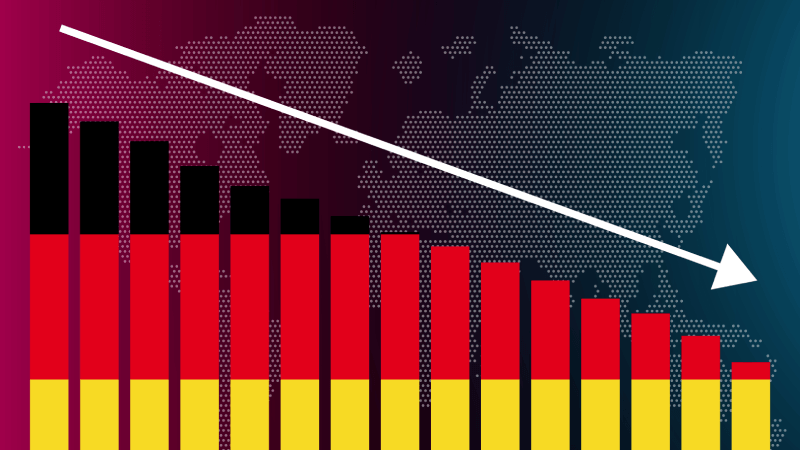Germany, known as Europe’s economic powerhouse, has faced significant challenges in 2023. Once considered a beacon of stability and growth, the nation’s economy has experienced a series of setbacks that have led to a contraction in GDP and raised concerns among stakeholders and analysts.
Germany’s economic performance took a hit in the third quarter of 2023, with a slight shrinkage of 0.1% compared to the previous three months. This decline confirmed initial estimates and highlighted the challenges faced by the country.
A combination of factors, including high energy costs, weak global orders, such as international trade, and higher interest rates, have taken a toll on the German economy.
The second quarter of the year saw minimal growth of 0.1% after a stagnant first quarter. But adjusted gross domestic product (GDP) contracted by 0.4% in the third quarter.
Private consumer spending, a crucial driver of economic growth, also experienced a 0.3% decline, while government consumer spending increased by 0.2% for the first time in over a year.
The Impact of the Russia-Ukraine Conflict
One significant factor contributing to Germany’s economic struggles is the Russia-Ukraine war and its aftermath. The conflict began in 2022 and had far-reaching consequences, including disruptions to energy supplies and heightened geopolitical tensions.
Germany, heavily reliant on cheap energy from Russia, experienced a shock when the conflict escalated. The historic dependence on Russian energy and the decision to decommission nuclear power plants in 2011 left Germany vulnerable to soaring energy prices.
The war in Ukraine also increased European natural gas prices, impacting Germany’s manufacturing base and overall economic stability.
High Inflation and Weakening Global Trade
Germany’s economic downturn can also be attributed to high inflation and weakening global trade. Inflation surged due to the Russia-Ukraine conflict, leading to decreased purchasing power and declining industrial production. The rise in inflation has impacted the power of purchase to the people, negatively impacting consumer spending, a vital component of GDP growth.
Furthermore, weaker global trade volumes have also affected Germany’s export-oriented economy. Industry and private consumption recovery has been slower than anticipated, exacerbating the economic decline.
Uncertainty and Austerity Measures
Major uncertainties, including a court ruling blocking the transfer of unused pandemic funds to green investments, have added to the challenges the German economy faces. This ruling created a 60 billion euro hole in the government’s budget, leading to concerns among industries about planned investments.
Government austerity measures aimed at addressing the budget shortfall could further cause a decline in economic growth. The uncertain economic climate has resulted in limited expectations of sudden increases in private consumption or investment, adding to the overall economic strain.
The Path to Economic Recovery
While Germany’s current economic situation appears challenging, the nation can navigate these difficulties and seek a path to recovery. Several measures and factors can contribute to a potential rebound in the economy, including:
Stabilizing Energy Costs and Supply
Addressing the issue of energy costs and supply is crucial for Germany’s economic recovery. Diversifying energy sources and reducing reliance on a single country like Russia can enhance energy security and stability.
Investing in renewable energy infrastructure and technologies can also help reduce dependence on fossil fuels while creating new job opportunities and stimulating economic growth.
Supporting Consumer and Business Confidence
Boosting consumer and business confidence is essential for revitalizing the German economy. Implementing measures to alleviate the impact of high inflation on real incomes and promoting policies that encourage spending can stimulate consumer demand.
Providing financial support and incentives for businesses, particularly in sectors heavily impacted by the economic downturn, can help restore confidence and drive investment and growth.
Strengthening Global Trade Relations
Enhancing global trade relations is vital for Germany’s export-oriented economy. Exploring new markets and diversifying export destinations can reduce dependency on specific regions and mitigate the impact of global economic fluctuations.
Establishing strategic trade agreements and partnerships with countries outside of traditional markets can open new opportunities for German businesses.
Investing in Research and Innovation
Investing in research and innovation can drive long-term economic growth and competitiveness. Germany has a strong reputation for technological advancements and engineering excellence. Continued investment in research and development, particularly in emerging fields such as renewable energy, digitalization, and automation, can position Germany at the forefront of global innovation.
Addressing Demographic Challenges
Germany’s aging population poses a long-term challenge to its economy. The decline in the working-age population can hinder economic growth. Implementing policies to address demographic challenges, such as encouraging immigration, promoting workforce participation, and supporting skills development, can help mitigate the impact of an aging population.
Germany’s economy currently faces significant challenges, but there are reasons for cautious optimism. Stabilizing energy costs, supporting consumer and business confidence, strengthening global trade relations, investing in research and innovation, and addressing demographic challenges can pave the way for economic recovery.
The road to recovery may be gradual, and uncertainties remain, but Germany’s resilience and track record as an economic powerhouse provide hope for a brighter future.
Navigating these challenges and adapting to the changing global landscape will be crucial for Germany. By leveraging its strengths and seizing opportunities, the country can regain its position as an economic leader, contributing to the overall growth and stability of the European Union and the global economy.
**The opinions in this article are the author’s own and may not represent the views of The Diplomatic Insight. The organization does not endorse or assume responsibility for the content.
A diligent individual with a Bachelor's in International Relations and currently pursuing a Master's in Political Science at the University of Cologne, Germany. With a strong academic background and a passion for understanding global politics, I aim to make a meaningful impact in the field of international affairs.



